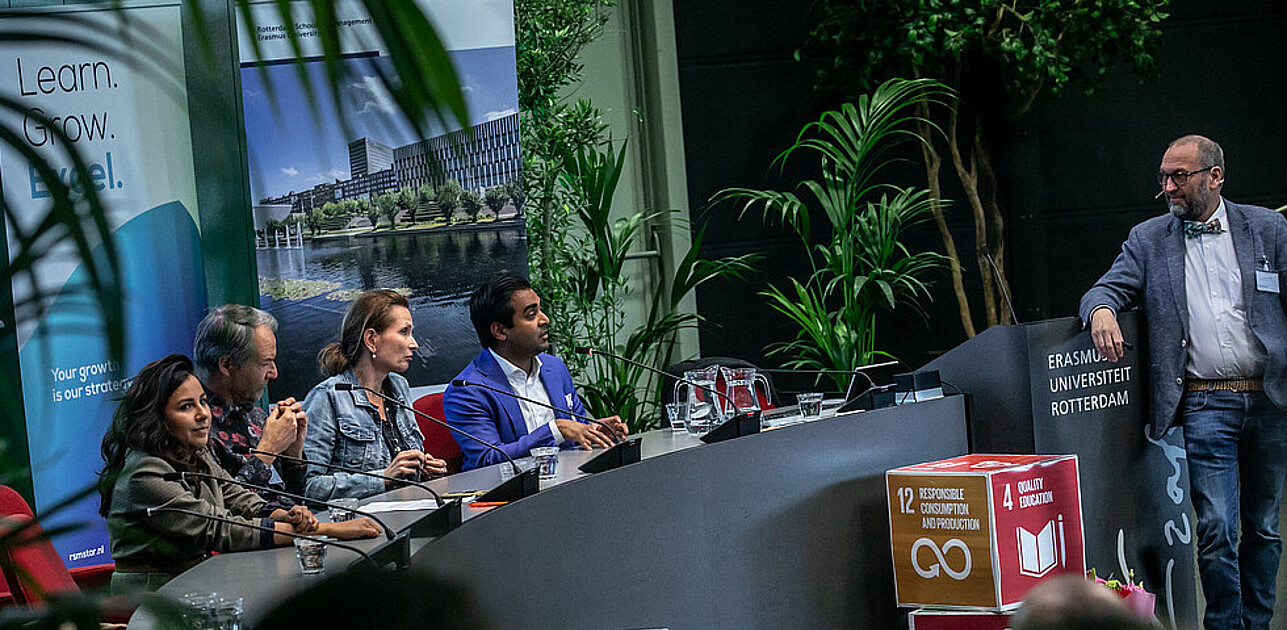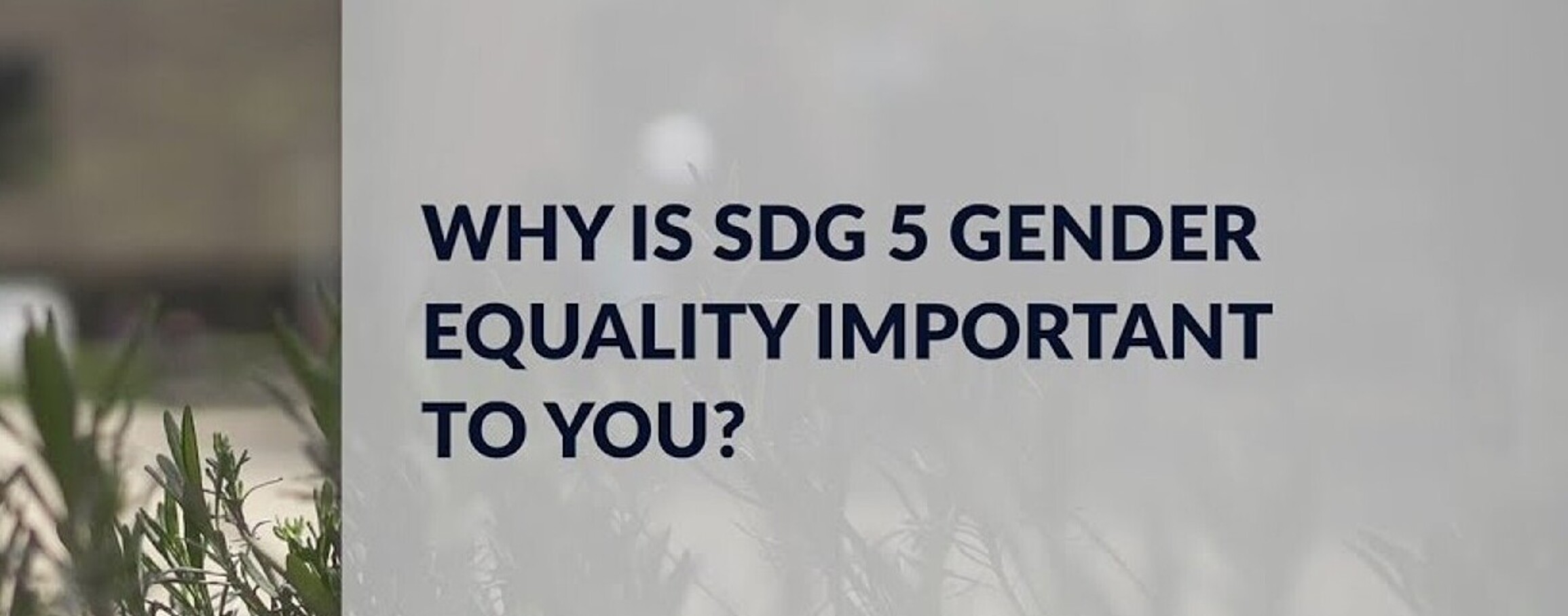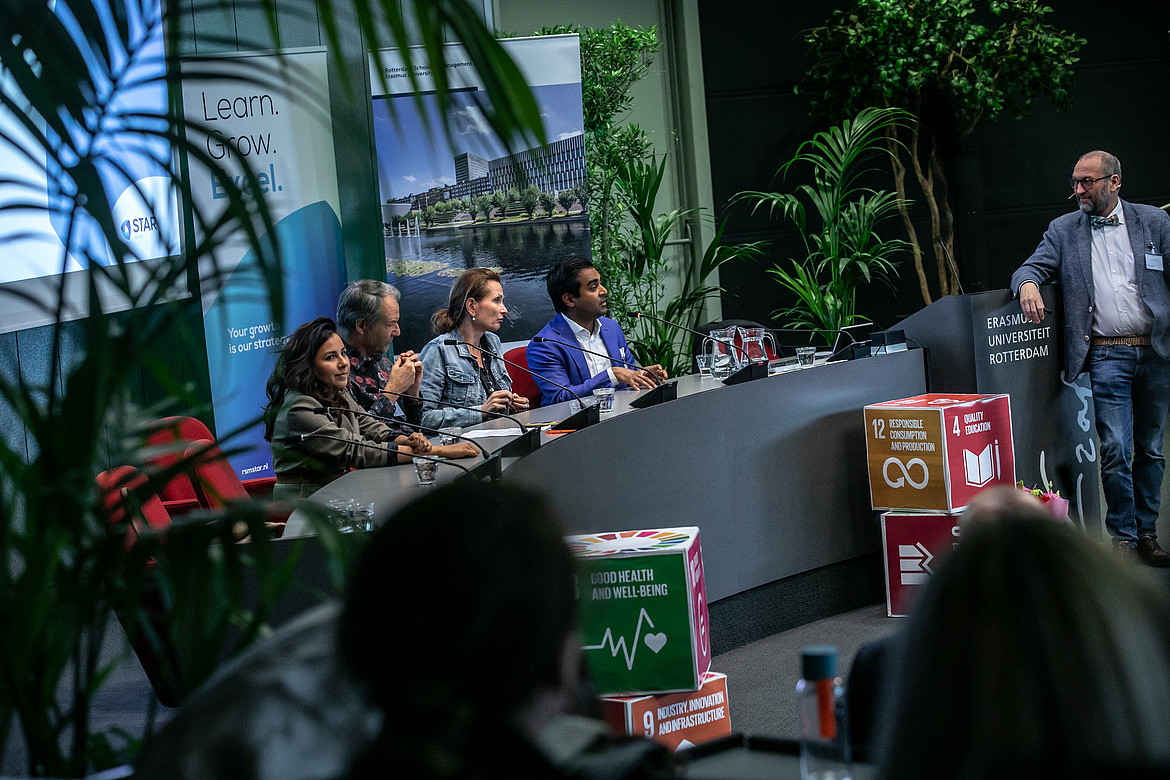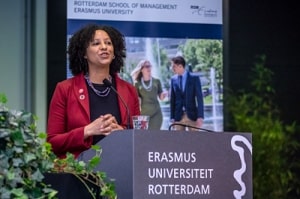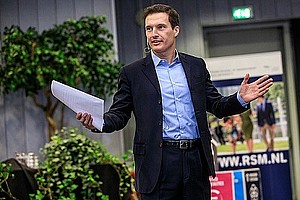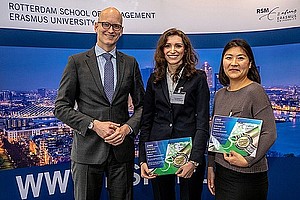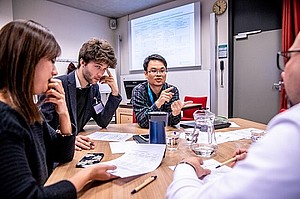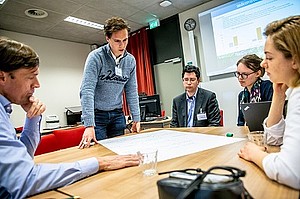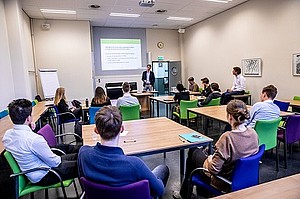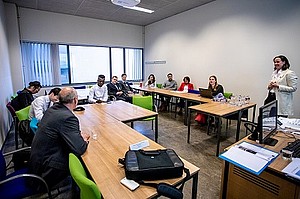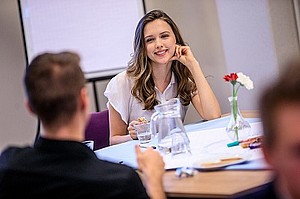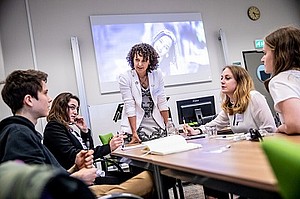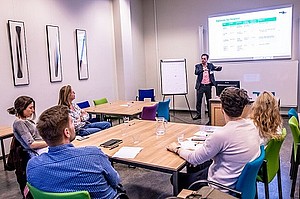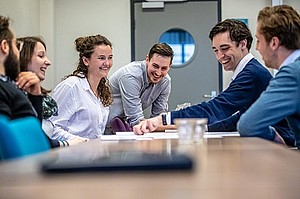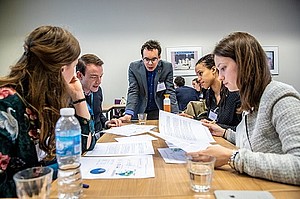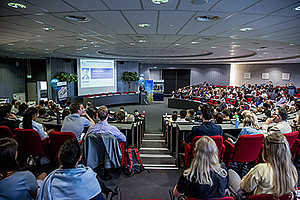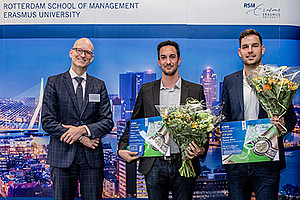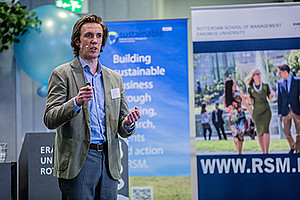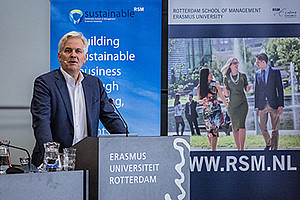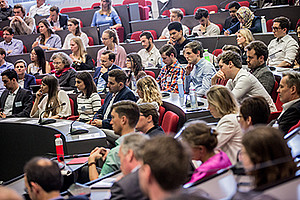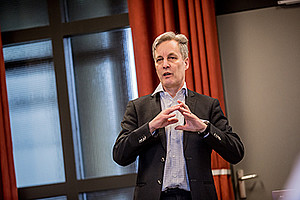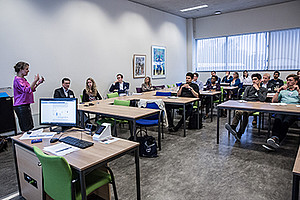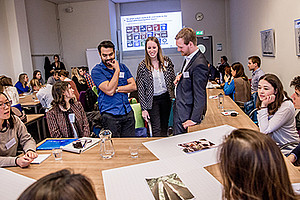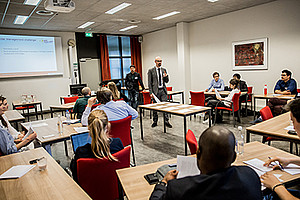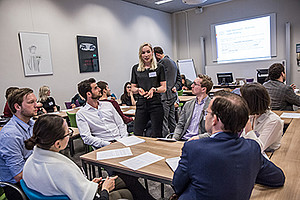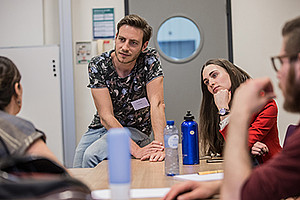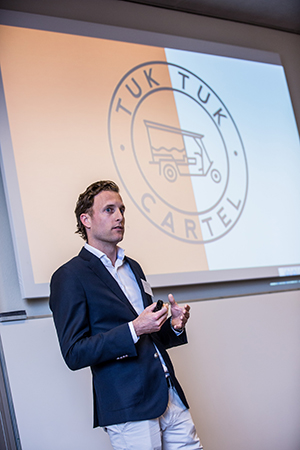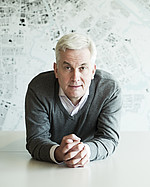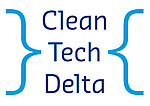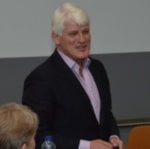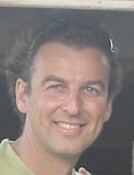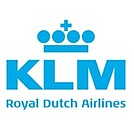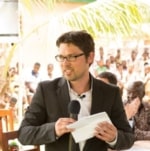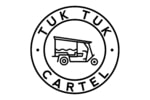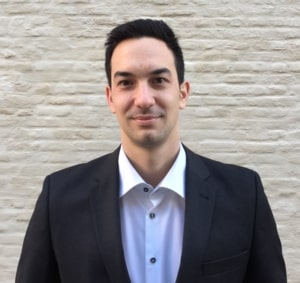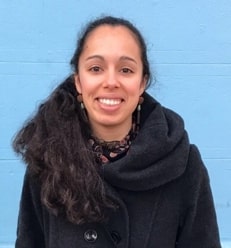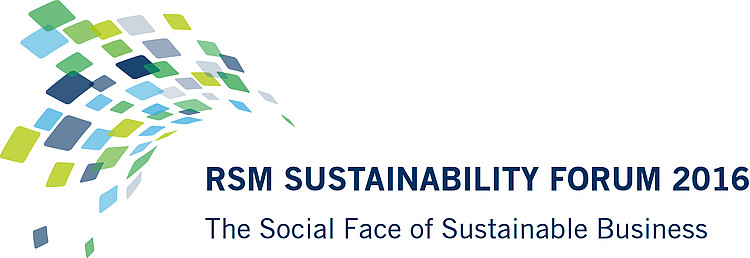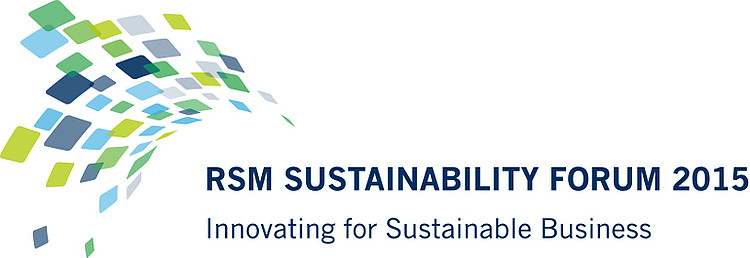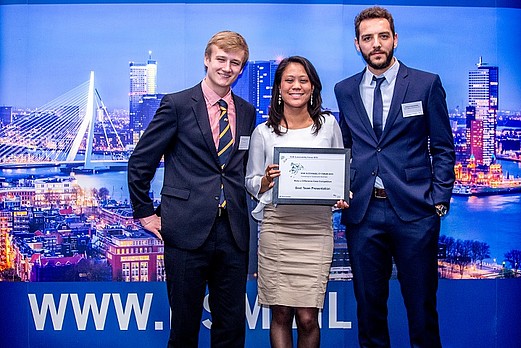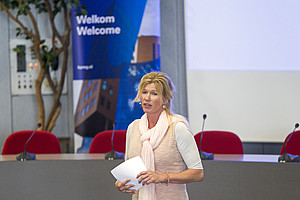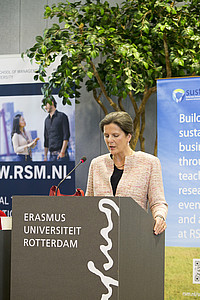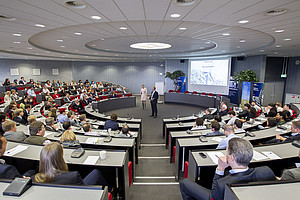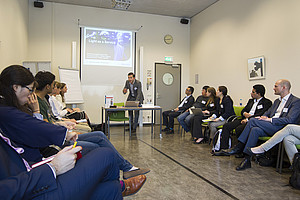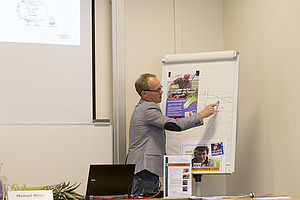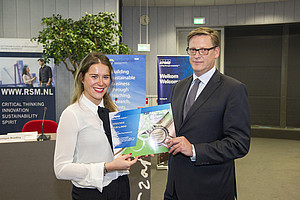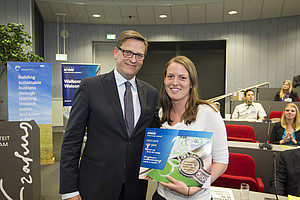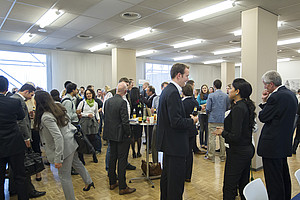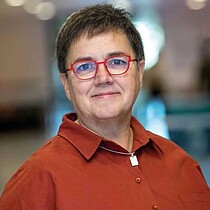We aim to inspire and motivate current RSM students to become the future changemakers that our society needs. At the RSM-STAR Changemaker Forum, business leaders and alumni in several industries share their journey around the topics that every changemaker talks about the most: sustainability, purpose-driven leadership, responsible entrepreneurship, and positive social impacts. The event builds on the essence of the previous Sustainability Forums, and expands the discussion around sustainability to a broader scope: ‘a positive change’.
Read about previous editions
> Smashing clichés: has business really changed for the better?
> Time for a critical conversation about sustainable business

The annual KPMG-RSM Master Sustainability Thesis Award aims to honour work which combines academic excellence and business relevance in the subject of sustainability management. To qualify, thesis subjects must be related to social and ecological sustainability and have achieved a mark of at least 8.5 during the thesis defense. Theses from the past academic year are reviewed. A final shortlist presents five theses, chosen according to their academic excellence, socio-environmental impact, business relevance, and originality. The winner is picked by a select jury of external leaders working in the field of corporate sustainability.
Winners & nominees
Winner: Antonio Cambio
MSc Master International Management - CEMS
Thesis: Achieving Supply Security: How Resource-Dependent Firms Threatened by Climate
Risk Adapt to Climate Change, examines the intensified threat of vulnerable global supply chains by climate change. His study gives clear recommendations and investigates which strategies mitigate risks and increase resilience, from both social and environmental impact standpoints. His findings further suggest that bridging and buffering strategies should be combined to improve resilience against sudden supply chain disruptions and to decrease the overall vulnerability of wide supply chains.
Runner-up: Jonne van Gils
MSc Global Business and Sustaianability
Thesis: Is the Cloud the way to Green? Cloud Technology Impact on Corporate Sustainability provides clear guidelines and implications for choosing to use cloud technology. Furthermore, the jury noted that Jonne’s findings can be translated across a large range of companies, thereby potentially creating a large impact on a global scale.
The shortlisted award nominees and their thesis titles:
- Bloeme Cohen (MSc Global Business & Sustainability) – Frugal innovation: a pathway to inclusive development? A study of fortified food in West Africa through a gender lens
- Darpana Vellanki (MSc Global Business & Sustainability) – How brands in the Dutch textile industry can build cascading networks for product life extension to create circular production and consumption systems
- Iris Budie (MSc Global Business & Sustainability) – Steering, structuring and governing sustainability in the dairy trading industry
Winner: Florian Frenken
MSc Business Information Management
Thesis: A data mining approach to garment size chart optimization and online garment size recommendation
Florian Frenken focused on optimization of garment size charts and online recommendation, as one of the biggest concerns in the apparel industry is the returned clothes. Due to COVID-19, an increase of online shopping happened which would only increase the 15 million tons of carbon emission and two billion kilograms of landfill waste. The study provides a different tool to provide customers with the applicable measurements needed to buy clothing. The thesis addresses social and sustainable impact as people would become more comfortable with buying clothes that fits them, and there would be fewer returns and less packaging waste. This can decrease carbon emission and landfill waste and saves logistics, production and shipping costs for businesses.
Runner up: Maurits Pluimakers
MSc Supply Chain Management)
Maurits Pluimakers investigated a radical approach to reduce the carbon footprint in the shipping industry. He suggests a different model to engage stakeholders around terminals to change the current first come, first serve model and replace this with a system focusing on the most optimal sailing speed from an environmental perspective. It would reduce the CO2 emissions for one ship by 25 per cent, which would be the equivalent of the annual gas consumption of 215 cars. The model would also be applicable to other supply chains. The jury appreciated the methodical analysis of the different stakeholders and the system in which they operate as one of the most important aspects of sustainability is to recognise the system to be able to disrupt it.
Nominees
Sandra Slotboom
MSc Global Business & Sustainability
Thesis: The Innovation of business models for social-ecological resilience
Sandra Slotboom describes the case study of La Almendrehesa where an innovative business model is used to restore landscapes an build a business model focusing on four returns: return of inspiration, return of social capital, return of natural capital, and return of financial capital. The jury saw the results from this thorough thesis as a stepping stone for others to implement their own social-ecological innovative business models.
Manuel Weber
MSc Global Business & Sustainability
Thesis: Toward an economy that makes us thrive regardless of economic growth
This new method, designed by Manuel Lucas Weber, measures growth which is not based on the GDP. It provides valuable insides in how a society can overcome the focus on economic growth and instead focus our efforts into a more sustainable method of thinking about growth. The jury appreciated the thought-provoking thesis which could have a potential impact on the environment and society.
Sophie Gommers
MSc Business Information Management
The jury was impressed with the innovative, data-driven method that Sophie Gommers used to show how Twitter data can be used to determine or extract certain information. Specifically, Sophie researched whether it was possible to use Twitter to determine the geographical distribution of people with depression and the influence of socioeconomic indicators to identify vulnerable individuals with a risk of depression. The jury saw a lot of promise and opportunities for this research in different context.
Winner: Dionne van der Nat
MSc Human Resource Management
Thesis: Gendered wording in managerial recruitment materials: How organizations lose potential female applicants
Van der Nat’s thesis addresses how the stereotyping of occupational areas and managerial experience influences women’s inclination to apply for top-level positions. Her study tested whether managerial recruitment materials are perceived as ‘masculine’ or ‘feminine’ and what effect this has on potential candidates’ inclination to apply. She found that women rate managerial recruitment materials as more agentic than men do – so they are less inclined to apply. Van der Nat also found that managerial stereotypes for roles and requirements for managerial experience have a significant influence on women’s inclination to apply. Jerwin Tholen of KPMG and chairman of the jury found the thesis very specific and its recommendations easy to implement. “Almost all companies have gender balance ambitions in top positions and there’s still a way to go,” he said.
Runner-up: Sam van Houten
MSc Business Information Management
Thesis: The price and volume dynamics of inland Rhine shipping in relation to climate induced water level changes
Since the potential implications of the changing climate on the water levels are realistic, this thesis researches a very important phenomenon. It provides information in particular for supply chain actors and how they are affected by the ongoing climate crisis developments. Van Houten maps out different scenarios that allow for a deep analysis on a long-term spectrum. It gives an indication of how likely each scenario is which makes the thesis highly applicable for companies that are uncertain how to structure their operations to be flexible for possible changes in the long-term. It also encourages companies to realize the severity of the climate crisis on their business operations and that they need to undergo serious structural changes that value the environment’s role in their logistics.
Nominees
Uli Fretzen
MSc Business Information Management
Thesis: Temporal city-scale matching of solar photovoltaic generation and electric vehicle charging
Fretzen highlights the realisation that the environmental impact of electric vehicles is highly dependent on the energy source used for the charging stations. The thesis allows the providers of charging stations in major cities to reflect on their responsibility to provide clean energy for electric vehicle users. It explains the shift of environmental responsibility away from the company manufacturing the car to the company providing electric fuel.
The thesis maps out multiple strategies to increase the use of solar panels to charge electric vehicles and illustrates them through a real-life case in Rotterdam. It also legitimizes experimenting with demand-response strategies which companies can employ to try out different tactics.
Marie Bonnot
MSc Global Business and Sustainability
Thesis: A Contested Concept Private Sector Engagement in Refugee Integration
The topic of private sector engagement in refugee integration presented by Bonnot deals with an important subject of social sustainability that is especially relevant for European countries following the refugee crisis. The thesis clearly outlines the business case for engaging in refugee integration and gives companies an incentive to do so. Through an analysis of internal and external factors influencing companies to engage with refugees, the author is able to identify benefits and barriers through well researched interviews with various multi internationals that have experience in the field.
Julie Loyson
MSc Global Business & Sustainability
Thesis: Money can make the economy go circular
Loyson identifies and evaluates barriers and enablers for financiers to financially support SMEs in their quest to translate circular business models from theory to practice. She inductively researched the Dutch financial sectors to conceptualize reasons for financiers to support circular SMEs. She also identifies the possible reason for financiers to not engage with circular SMEs and provides and explanation that can be clearly addressed to overcome this barrier. Thus, the thesis is rather extensive in its insights for both circular SMEs that are looking to attract funding as well as financiers that which to support them.
Winner: Paul Ruijs
MSc Global Business & Sustainability
Thesis title: Overcoming short-termism of investors, a barrier for sustainable development contributions
The thesis considers sustainable development initiatives as a form of investment, i.e. strategic decisions involving key investors. It addresses the dynamics between investors and sustainability approaches that trigger companies to exploit their ability to attract the kind of investors that suit their sustainable development agenda.
Runner-up: Annelou Ringers
MSc Supply Chain Management
Thesis: The implementation of socially responsible purchasing in the fast fashion industry - A critical evaluation of existing SRP practices in Bangladesh and China
The thesis is about socially responsible purchasing in the fast fashion industry. She adapted existing models to the context of tier-one ready-made garment purchasing in China and Bangladesh. Current socially responsible purchasing mechanisms appear to merely counter the problems in the fast fashion industry. Her thesis addresses the recent, harrowing developments in Bangladesh. To foster long-term social sustainability, Ringers calls for the entire fast fashion model to be reconsidered. Her innovative thinking points towards blockchain and 3D printing technology to support better business.
Nominees
Theodoor Klaauw
MSc Business Information Management
Thesis: How does partnership composition affect project performance in smart city ecosystems?
The thesis provides insights into how the composition of smart city partnerships affect project performance. Based on the Collaborative Governance model, the author came up with an adjusted model showing a direct relationship between partnership composition and project performance. Multiple partnership success characteristics are identified, namely ecosystem size, clear role distribution and expectations, resilience and flexibility, governance structure, and business-market combinations.
The study provides direction to ensure that the right mix of interests will be presented in smart city ecosystems and develops a framework that helps optimize project performance. Multiple conclusions are reached and most arguments for conclusions are well-thought.
Carolin Lanfer
MSc Global Business & Sustainability
Thesis Title: Implementation of Disruptive Circular Business Models Enabling an Industry-Wide Transformation Towards a Circular Economy
The author identified and evaluated organizational practices to support companies in the implementation of disruptive circular business models with the goal of an industry-wide transformation. The study found that the identification of a problem with the current linear system causes individuals or companies to set up a circular business model and work towards a systems-wide circular vision.
This thesis offers additional insights that may be relevant for organizations such as the role of funding and crowdfunding to achieve circular economy, risk barriers of a new business model, the role of customers as ambassadors of the new model, obstacles to scale-up circular businesses, collaboration with competitors (coopetition), among many others.
Jaap van Beek
MSc Supply Chain Management
Thesis: Can traceability be the solution to social and environmental sustainability problems in the cocoa industry?
The topic of traceability presented by the author deals with processes in industries that are hard to monitor. By creating a cross-over between data governance and the food industry supply chain, the author outlines a technical solution to the very real, tangible problems of safety, quality, ethics and sustainable production in the food industry. Van Beek presents a thesis on data governance, fraudulent mixing, transaction cost economics and offers a critical view on the possibilities of traceability in the food industry.
Winner: Tatjana Mirosnicenko
MSc Supply Chain Management
Thesis: E-grocery: the effectiveness of content sharing on social media in promoting green slot choice behavior
The thesis describes four clear wins for retailers in her thesis:
1. Transport efficiency and a reduced footprint of traffic, not only through the delivery vehicle itself but also the reduction of emissions from cars that have to wait when streets are blocked. By promoting ‘green-slots’, consumers are incentivised to pick similar time-frames that will lead to consolidation of shipments.
2. Increased brand loyalty – consumers like the solution and feel good about it.
3. Increased brand awareness – every post on social media contributes to a green image of the retailer.
4. Cost reductions for the retailer and transporter. Green slot choices stimulate customer to have their orders delivered around the same time. In this way, shipments can be consolidated and transportation can be reduced.
Runner-up: Thomas Behrendt
MSc International Management/CEMS
Thesis: Rethinking episodic volunteering in the light of the gig economy.
Behrendt’s research reveals that short-term volunteers can enhance NGOs’ performances through knowledge and expertise, increased productivity through high motivation, a focus on clear goals, and a focus on the core tasks of the organisation. The author examines how volunteer-based organizations can leverage productivity-related benefits of episodic volunteering. Episodic volunteering often has a negative connotation because it can require a lot of effort and extra hassle. This thesis shows potential benefits for productivity and how these can be facilitated.
Nominees
Jonathan Rüden
MSc Business Information Management
Thesis: Charging Ahead - Predicting Optimal Charging Station Locations across Multiple Cities
Rüden tackles an important and current topic and the insights can help to advance electric vehicle usage by enlarging the charging station coverage. By encouraging car sharing customers to test the EV risk-free, their likeliness to buy an EV is increased and a baseline demand for charging stations is ensued. Not only do the findings encourage sustainability but they show how a sustainable business model can be profitable for the supplier side as well.
The thesis is practically relevant for companies that are stakeholders of charging stations, for car sharing operators, for city authorities and public bodies. The model which was developed can be filled with data from different cities and subsequently used for decision-making support.
Merle Stadhouders
MSc Business Information Management
Thesis: Determinants of Longevity of Smart City Innovation Ecosystems and Projects
Stadhouder’s thesis is practically relevant for companies given the increased importance of smart cities, circular economy and scarcity of resources. Especially cities in developing countries have to deal with challenges of sustainability. Nowadays, many companies are interested in smart city projects. For smart city initiatives, many stakeholders (Government, Corporations, Start Ups etc.) have to be included and addressed but so far there is limited research on the longevity of smart city ecosystems. The thesis gives a comprehensive framework for smart city projects that can be applied by practitioners. The findings of the thesis can encourage a sustainable behaviour and promote smart city projects.
Nominee 3: Pam van Wanrooij
MSc Global Business & Sustainability
Thesis: The BOGO Model: A comparative case study
Van Wanrooij systematically analyses three different cases of BOGO strategies and their effectiveness for the business, non-profit and beneficiaries. It has great practical relevance as it outlines a best practice with regard to the implementation of a BOGO model for the aforementioned stakeholders. For companies the thesis provides insight on the advantages that can be derived from implementing a BOGO strategy as well as on how to design such approaches most effectively to reap the benefits. Moreover, similar models could be implemented by a diverse range of companies. That is why the thesis is thought to address a wide audience in the business community rather than focusing on a small niche.
Winner: Angelos Tsereklas-Zafeirkis
MScBA Master in Management
Thesis: Variable-rate Pricing of Electric Vehicle Charging: Exploring consumer behaviour using TamagoCar app
In his thesis, Tsereklas-Zafeirkis makes use of an app to gather data on the behaviour of users of electric cars. This data can be used as input into the design of charging systems to reduce peak congestion. It addresses the imminent problem of peak-time congestion at electric vehicle charging stations. Just like morning traffic jams, neighbours and colleagues will compete to use electric car charging facilities.
Runner-up: Florian Böhm
MSc in Global Business & Sustainability
Thesis: The grain of the gods against poverty: Approaching the quinoa value chain in Bolivia and Peru with inclusive business models
Böhm explores the impact of the growing global demand for quinoa on farming practices and poverty in Bolivia and Peru. The jury said: “This is a must-read for all sustainability, supply chain and procurement professionals that work for companies that buy, use and sell quinoa, and for consumers who are interested in the farmers that grow their quinoa. It reads like a practical baseline study for organisations like IDH – The Sustainable Trade Initiative or other multi-stakeholder platforms that create sustainable agricultural supply chains.”
Nominees
Jonas Flake
MSc International Management / CEMS
Thesis: Enabling Radical Sustainability-Oriented Innovation in Large Firms
Flake investigates how large firms can enable radical sustainability-oriented innovation (SOI) with a qualitative approach. Through interviews with managers and senior executives of large firms pursuing radical SOI, he enhances understanding of organisational conducive factors to radical SOI. It underlines the importance of the integration of an organizational focus on sustainability throughout the organization.
Patrizia Fazli
MSc Marketing Management
Thesis: Sustainability marketing communication in the beauty industry: How does the ideal sustainability advertisement in the beauty industry look like?
Companies are spending a huge amount of money on advertising and a big share of the budget is contributing to the price of the product. The research gives specific implications on how to advertise sustainability in a product to better sell it. Fazil demonstrates the desire for and ability to perform sustainable marketing in the beauty industry and shows it efficacy. The biggest problem with this is that marketing efforts does not always necessarily translate to actual sustainable practices. However, she did find that consumers are not attracted to just one sustainability label on a product; there must be at least two. This is reassuring although not definitive in terms of intentionally buying actual sustainable goods.
Adele Berthelot
MSc Supply Chain Management
Thesis: Supply Chain Collaboration and Environmental Performance. A Study of Connekt Lean & Green
Although collaboration can lead to environmentally and socially responsible behaviour, this thesis focuses on the link between integrating supply chain collaboration and strong positive economic benefits, which outweigh the risks of sharing information with stakeholders. This information is very useful to Connekt Lean & Green and companies interested, able and qualified to join in on supply chain collaboration. This includes 400 companies and is therefore relevant to a large enough number of companies for it to have a high score in this section.
Winner: Tirza Voss
MSc in International Management/CEMS
Thesis: Partnering up for fair trade climate-neutral coffee
Voss researched the influence of cross-sector partnerships on sustainability-oriented innovations, and selected fair trade climate-neutral coffee as her case study. “Tirza Voss shows how cross-sector partnerships can have an influence on all aspects of sustainability, market knowledge, network building and increased sustainable innovation,” the jury said. “This is really important in today’s sustainability developments. The next step in further enhancing sustainability is not within a business or a sector but across sectors through cross-sector partnerships,” he said, adding that this is difficult, because involved parties have different histories, backgrounds, cultures and missions. “This thesis provides a solid base for parties to explore new cross-sectoral partnerships and learn from it due to the handy, comprehensive and practical checklists.”
Runner-up: Nadine Kooiker
MSc in Marketing Management
Thesis: Educating for the future: a multi perspective case study on sustainable business education in the marketing curriculum
She researched a multi-perspective case study on sustainable business education in the marketing curriculum. The jury said the thesis can be used by business schools and universities to teach incorporating sustainability into the mainstream curriculum in the most efficient way in terms of budgeting and learning outcomes. “The thesis is generally aimed at educating our future leaders, so the potential social impact is large,” the jury said. “Nadine Kooiker’s research includes strong recommendations to overcome behavioural, structural and economic barriers in a way that RSM and other business schools can move forward to further educate future leaders with sustainability knowledge, skills and attitudes.”
Nominees
A.F. ten Brinke
MSc International Management/CEMS
Thesis: Made to market - An exploratory research of user involvement in radical sustainability-oriented innovations
Consumption of unsustainable products is the main driver behind sustainable solutions that can succeed only through successful commercialization. Shifting towards sustainability cannot occur without radical, system-changing innovation. Involving consumers in new product development also gives them a say in the product quality (consumer rights). Brinke provides inspiration as to when to involve customers in the development process of new innovations – and what the motives of innovation should be. Even though SMEs are studied, large established companies can learn lessons to regain innovative sustainability-oriented capacity as all companies are seeking to innovate.
Rowan Siskens
MSc Business Information Management
Thesis: Incentives for off-peak charging of electric vehicles
Siskens influences policy makers and civil society leaders in several ways, such as redefining the tax incentive to attract more environmentally driven people instead of mostly attracting business drivers which create imbalances. The findings suggest that in order to change the charging behaviour of EV drivers, a change in the financial incentive is needed which should come from the government. If implemented, the findings can mitigate a relevant environmental as well as societal issue such as the excessive demand for electricity by EV which leads to expanding the capacity of energy infrastructures and thus spending too much resources into construction. CO2 reduction is also a potential result of implementing the findings of the study.
Vincent de Wolf
MSc Strategic Management
Thesis Title: Merging social benefit and business value
De Wolf’s thesis can have great implications for firms and the reception is expected to be great for those firms producing in developing countries with dependency on raw materials and commodities. The propositions show that firms must be locally engaged, raise local income, and create awareness. For Nestlé this resulted in higher consumption of their products locally and higher appreciation of the corporation by the farmers. The thesis allows firms to see the benefits associated with such behavior and can hence lead to a change in their practices.
Winner: Maaike Antrag
MSc Supply Chain Management
Thesis: Designing a take-back network for the e-waste from webshops’ customers
This study was especially conducted for PostNL managers and proves to be of major use for this company. The author strongly emphasized the importance of finding solutions that comply with legislation, that satisfy stakeholders, and that is economically feasible for PostNL. Having taken into account these three aspects necessarily increase the relevance of the study to managers. The financial structure is an example of a key point of interest that is essential when investigating solutions for the return process of e-waste; in this study, Antrag goes in very much detail as to the strength and weaknesses of different models.
It is evident that this thesis gives well-researched and pragmatic advice for this company as well as for other companies asking themselves similar questions on the return process of e-waste and in a similar legislative environment.
Runner-up: Sjaak Heuvels
MSc Global Business and Stakeholder Management
Thesis: Transitioning towards a biobased and sustainable construction industry - The case of hempbased applications in the Dutch construction industry
This thesis shows great insights into how hemp based products are doing good for the environment. Hemp based products are more permeable, more environmentally friendly, and healthier. The Green Deal will help create more working space for commercial parties to produce and apply such materials. By creating more jobs, social welfare will improve.
In addition, the construction industry is one of the least sustainable industries that exists. Moving towards more bio-based materials (such as hemp based) will have a strong environmental impact.
Nominees
Michelle Engert
MSc Supply Chain Management
Thesis Title: Taking an Environmental Perspective on Supply Chain Management – A Study on the German Automobile Industry
This study fills in a major gap in the literature by distinguishing the Environmental and Economic Performance of a company. This results in a more understandable analysis for managers – who tend to distinguish these aspects of operations – and hence can make them better realise the need for investments in global supply chain management (GSCM).
Additionally, the study reveals that the investments a firm makes in GSCM will lead to an improved ‘Relational Efficiency’ thanks to the increased transparency and understanding of challenges ahead that this action shows. These findings are pragmatic and can shed light on the importance of GSCM for companies as well as the positive impact this will have on their operations.
Berdien Fennema
MSc Supply Chain Management
Thesis: Less is more: an evaluation of sustainable supply strategies
Fennema evaluates the sustainable supply strategies and formulates applicable recommendations for all companies who are concerned with sustainable supply strategies. Sustainable supply strategies are critical to companies, as they would like to meet the demands of their customers and/or consumers. Moreover, they have to deal with the dependency on suppliers throughout the entire value chain. In order to maximize the advantages of sustainable practices, Fennema advises a pro-active approach in which collaboration along the Supply Chain is key. She concludes with a detailed step-by-step procedure to optimize waste prevention, which is very convenient for companies to apply.
Stephanie Maas
MSc Global Business and Stakeholder Management
Thesis: Do-in-a-day episodic volunteering as a gateway to long-term volunteering
The study researches how a great experience of (a first time) episodic volunteering can lead to long-term volunteering. Maas finds multiple factors that influence episodic volunteers to join on a longer term timeframe: (1) a positive experience during the one day event, (2) know and meet the volunteer’s expectations during that same day (3) encourage autonomy, task identity/ significance/ variety, and feedback on the task, (4) personally thank the volunteers for their work/ perform a good joint closure. Maas mostly focused on the one day volunteering event organized in the Netherlands however these findings could also be applied to other such events in the world.
Read about previous ceremonies
> Achieving Supply Security: How Resource-Dependent Firms Threatened by Climate
> Gender-balanced leadership recruitment thesis wins KPMG Sustainability Award
> Short-termism in investments wins KPMG RSM Sustainable Thesis Award 2019
> KPMG sustainability award for green choice behaviour on e-grocery
We’re holding 17 events, one for each of the UN’s Sustainable Development Goals (SDGs) because 2020 marks the start of a decade of action to deliver them. Deadline 2030 was announced by UN Deputy Secretary General, Amina J. Mohammed.
Join us in taking action to deliver the SDGs!
Explore the development goals with our experts
We invite experts in business and management to each SDG event; they are leading practitioners as well as academics. Their presentations may help you to identify ways that you and your organisation can contribute to the SDGs.
How? The intimate settings and lively debates in our SDG Insight events are designed to:
- trigger constructive debate
- enable guests to exchange knowledge
- give everyone new insights.
If you’re interested in knowing more about addressing the SDGs in business and society and hearing from different perspectives, then join us.
The events will be hosted on RSM’s campus. They take the form of a masterclass, and the presentations are followed by Q&A sessions and group discussions.
